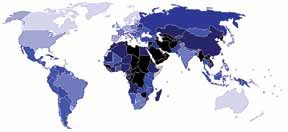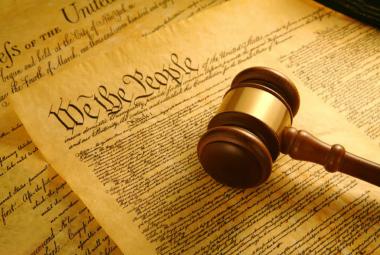“Democracy” is a word heralded from many media venues these days. It makes sense, as “we the people” have been engaging in angry uprisings in various spots around the globe for a host of reasons. For our discussion, the reasons behind the uprisings are not as important as the one key commonality—change in leadership.
Democracy is considered a form of political organization in which all people—through consensus, direct referendum, or elected representatives—exercise equal control over the matters which affect their interests.
Even though there is not a specific, universally accepted definition of “democracy,” equality and freedom have been identified as foundational characteristics since ancient times.
There are a wide variety of democracies that span the globe, some of which provide better representation and freedoms for their citizens than others. However, it is clear that without carefully legislated distribution of political power, a branch of the democratic system of rule could accumulate power, and thus become undemocratic.
As I have been scanning the headlines in past weeks and listening to people demand the oust of dictatorial regimes, the words of Winston Churchill came to mind:
Democracy is the worst form of government, but it’s the best we have.
America’s Role
The United States government would agree with that statement. In an excerpt from its website, the U.S. State Department affirms the criticality of promoting democracy as the foundation of foreign policy:
Democracy and respect for human rights have long been central components of U.S. foreign policy. Supporting democracy not only promotes such fundamental American values as religious freedom and worker rights, but also helps create a more secure, stable, and prosperous global arena in which the United States can advance its national interests. In addition, democracy is the one national interest that helps to secure all the others. Democratically governed nations are more likely to se-cure the peace, deter aggression, expand open markets, promote economic development, protect American citizens, combat international terrorism and crime, uphold human and worker rights, avoid humanitarian crises and refugee flows, improve the global environment, and protect human health.
With these goals in mind, the United States seeks to:
• Promote democracy as a means to achieve security, stability, and prosperity for the entire world;
• Assist newly formed democracies in implementing democratic principles;
• Assist democracy advocates around the world to establish vibrant democracies in their own countries; and
• Identify and denounce regimes that deny their citizens the right to choose their leaders in elections that are free, fair, and transparent.
The Promise of Democracy
Indeed, as we once watched communism sweep westward, we now see democracy sweeping eastward. With it comes the salve of the promise of peace, prosperity, and success.
The rapid expansion of democracy is visible in the Economist Intelligence Unit’s Democracy Index, which is based on 60 indicators grouped in five categories: electoral process and pluralism, civil liberties, functioning of government, political participation, and political culture. The Index was first produced in 2006 with updates every two years.
According to The Economist Intelligence Unit’s Democracy Index published in December 2010, 67% of the countries operate within a form of democratic government which controls 63.5% of the world’s population.
A map of the world, highlighted on a scale from light blue to black, based on the score each country received for 2010, from a scale of 10 to 1, with 10 being the most democratic, and 0 being the least democratic.

Norway scored the highest with 9.80, and not surprisingly, North Korea scored the lowest with 1.08.
The leadership of the countries represented in black are be-ginning to feel the wrath of “we the people” as they clamor for their voices to be heard in Egypt, Tunisia, Libya, Bahrain, Jordon, and elsewhere. The people believe in the promise of a better life and want a say in how they are governed.
Be Careful What You Ask For
There was a time when I would have cheered for the people—stand up against tyranny in all forms. That was before I truly understood the prophecies that proclaim the Final World Leader and gained a different perspective from Arno Froese as presented in “How Democracy Will Elect the Antichrist.”
Americans are freedom-loving people. This country stood as a beacon of freedom for decades, and as stated by our State Department, we will continue to promote democracy around the world. Unfortunately, we are not establishing freedom to worship the one true God, but we are creating the “god of freedom.”
Each country that embraces democracy becomes a paving stone along the road to the Final World Leader. Each dictatorial regime that fails is one less road block to unity—Unity in Diversity.
The speed with which democracy spread following the fall of the Berlin Wall took the communist world by surprise. To quote Mr. Froese:
The danger of democracy lies in the ironic fact that it will ultimately not tolerate any opposition. The new world democracy of the last days will become, in effect, a world dictatorship.
In a foreshadowing of the possibilities, it is important to re-member that Adolph Hitler was brought to power by popular vote in pre-World War II Germany.
As Europe rebuilt after the devastation of World War II, Unity in Diversity became the standard. Individuals became associated with the company they work for instead of their country of residence. A common currency meant greater economic freedom and prosperity.
Reminiscent of religious freedom during the Roman Empire, in which any god could be worshipped so long as Caesar was supreme, religious freedom meant everyone worshipped the same “god,” even if that god was yourself. All of Europe embraced democracy and the European Union became possible.
The Apple of His Eye
When Israel attained statehood on May 14, 1948, it became the barometer of world events. In the decades that passed since, the focus of all geopolitical events gradually zeroed in on the Middle East.
Peace became the mantra. Peace at all costs became the goal of negotiations. Israel was the only true functioning democracy in the Middle East and her people demand peace.
It is not the first time Israelis chose for themselves who will rule them. In 1 Samuel 8, the people cried, “Make us a king to judge us like all the nations.” God allowed the “democratic process” and replied to Samuel, “Hearken unto the voice of the people in all that they say unto thee: for they have not rejected thee, but they have rejected me, that I should not rule over them.”
Israel continued to reject God’s theocracy until the time they cried against Jesus in John 19:15, “We have no king but Caesar.”
At this time in history, as Israel continues in its attempts to be like other nations, it is important to remember Jesus’ prophecy in John 5:43, “If another comes in his own name, him ye will receive.”
A State of Mind
Revelation 17:13-14 portrays the mind-set of the last days’ government: “These have one mind, and shall give their power and strength unto the beast. These shall make war with the Lamb.”
Representatives of every political system believe they have the ability to solve all of the world’s problems. Today, for the first time in history, people believe that democracy is the savior of the world.
God has been removed from education and public debate. Even in professing Christianity, society is being taught to over-emphasize man’s nobility, to think positive, and to build self-esteem. The majority of society now believes that sinful and corrupt men can be changed by analysis of self and through behavior modification programs.
As society realizes it cannot “fix” the world by elevating it-self as god and creating a great rule of the people, it will be easily deceived when that one person comes along with what appears to be the “answers.”
The utopia is short-lived, however. 1 Thessalonians 5:3 states: “For when they shall say, Peace and safety; then sudden destruction cometh upon them, as travail upon a woman with child; and they shall not escape.”
The Sign of the End
In a time when conspiracy theories abound, it behooves us to remember the two examples Jesus gave of Noah and Lot. Jesus listed the normal activities of daily life when He emphasized, “Thus shall it be in the day when the Son of man is revealed.”
Rather than focus on hidden political agendas or conspiracies by the world bankers and political leaders, we are instructed to look at the normal daily activities in which people place their hope on a better world, more righteousness, peace, and prosperity—without the Prince of Peace, Jesus Christ.
We are indeed in those times as the panacea of democracy fills the hearts of the people.
Notes:
Sources:
Froese, Arno. How Democracy Will Elect The Antichrist. The Olive Press, A Division of The Midnight Call, West Columbia, SC, 1997, 2007.
http://www.graphics.eiu.com/PDF/Democracy_Index_2010_web.pdf.
http://www.state.gov/g/drl/democ/.






